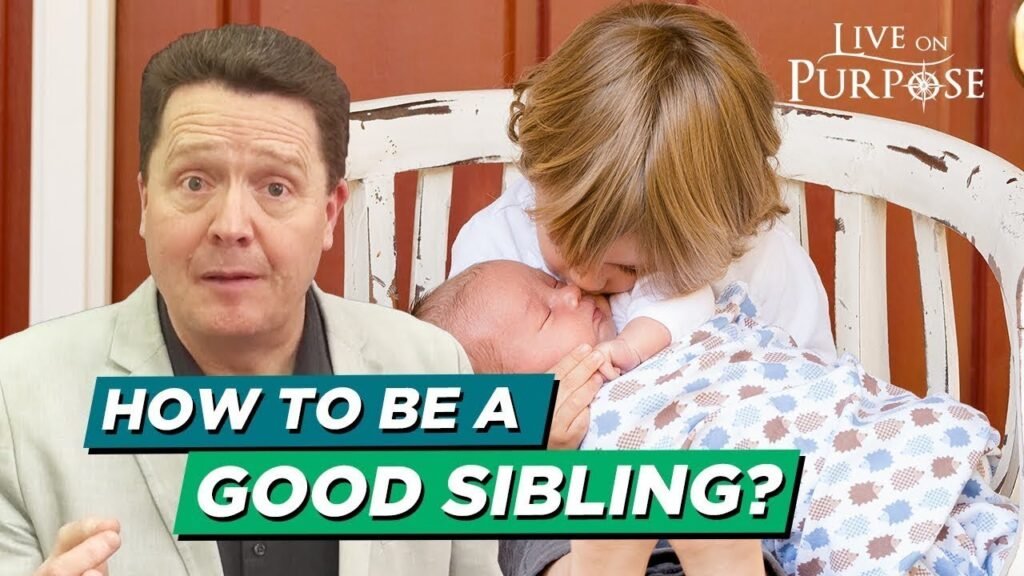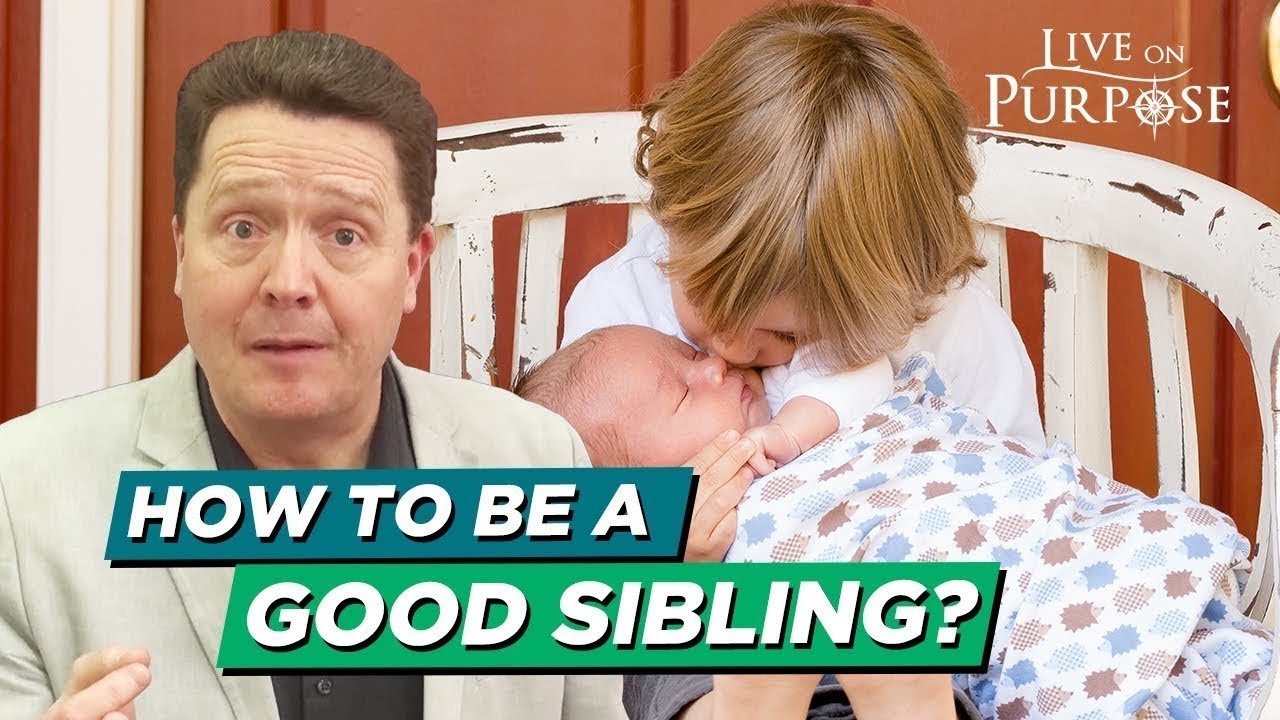Hey there, Live On Purpose Parents! Thank you so much for all your comments and suggestions. I’ve received a lot of questions about how to help a toddler adjust to a new baby, and in this video, I’m going to address that topic. When a new baby enters the family, it can be a challenging time for everyone, including your toddler. If your toddler has never been an older sibling before, they may need some guidance on how to adjust to this major change. Don’t assume that they already know what to do – they need to be taught. You can be their coach and help them navigate this new experience. Find time to spend with your toddler individually, both before and after the baby arrives. This one-on-one time is crucial for them to feel supported and loved during this transition. Additionally, don’t underestimate the power of talking to your toddler. Even if they may not fully understand everything, including them in conversations about the upcoming changes in the family dynamics can help them grasp the concept and feel more included. It’s important to involve your toddler in the preparations for the new baby. Even though they may not be able to do much, allowing them to help you in any way possible will make them feel a sense of ownership and anticipation for the baby’s arrival. Once the baby is here, find small ways to involve your toddler in the care of the new baby, such as helping you with diapers or other simple tasks. By modeling good care and involving your child, they will learn that babies require certain care and that taking care of them is a positive and important thing. Ultimately, involving your toddler throughout this process will help them adjust better to the new baby and create a more harmonious and loving family dynamic.
Teach Them What They Need to Do
When a new baby arrives and changes the family dynamic, it can be overwhelming for everyone, including your toddler. It’s important to remember that your toddler may not have any prior experience with being an older sibling, so it’s crucial to teach them what they need to do. Don’t assume that they already know how to handle this new role; instead, coach them through it.
As a parent, you may also be navigating this new experience for the first time, so it’s understandable if you need a little guidance. Reach out to other parents who have gone through this before and pick their brains for advice and tips. Additionally, take advantage of resources like videos and articles that can provide you with valuable insights on positive parenting and helping your toddler adjust to a new baby.
There are simple things you can do to help your toddler adjust to their new role. Keep reading to learn more about these strategies.
Find Time to Interact and Spend Time with Toddler
It’s important to continue prioritizing one-on-one time with your toddler, both before and after the new baby’s arrival. Even though your attention may be divided, finding time to interact and spend quality time with your toddler individually can go a long way in helping them adjust.
While it may be challenging to find time with a newborn in the picture, making an intentional effort is vital. Remember that your toddler still needs your love and attention, and involving them in activities that they enjoy can help them feel valued and supported.
Talk to Them About the Changes
Including your toddler in conversations about the changes that a new baby will bring can help them feel included and better understand the family dynamics. Even if they don’t fully grasp everything you’re saying, they will pick up on more than you think.
Having discussions about what to expect when the new baby arrives and involving them in family conversations can make them feel like an important part of the process. Research in psychology supports the idea that including toddlers in these conversations helps their adjustment process.

Involve Them in Preparations
Before the baby’s arrival, involve your toddler in preparing the space for the new addition. While they may not have a high skill set, allowing them to help in small ways can give them a sense of ownership and responsibility. This involvement can make the transition easier for them and create a sense of anticipation and excitement.
Anticipation plays a significant role in our happiness, and your toddler will also feel this sense of anticipation as they prepare for their new sibling. As you gather items and set up the nursery, include your toddler in the process and make them feel like an important part of getting ready for the baby.
Involve Them in Helping with the New Baby
Once the baby arrives, find small tasks that your toddler can safely and appropriately help with. While they may not be able to do everything, finding simple tasks like getting a diaper or handing you a bottle can make them feel important and part of the caregiving process.
Through their involvement, they will learn that taking care of the baby is essential and that their help makes a difference. This also helps them understand that they were once in the same position as the baby and that taking care of them leads to their growth and happiness.
Share their Role as Older Sibling
Helping your toddler understand their important role as an older sibling is crucial for their adjustment. Connect their own upbringing to the baby’s care, explaining how their role is vital in ensuring the baby’s well-being. This sense of teamwork can create a strong bond between them and the baby.
Encourage your toddler to spend time with the baby, assisting in gentle touch and interactions. By fostering this positive relationship, your toddler will become more comfortable and confident in their role as an older sibling.
Provide Reassurance and Affection
During this transitional period, your toddler may experience fears or anxieties about the new baby’s arrival. It’s essential to address these concerns and provide reassurance and support. Talk to them openly about their feelings and let them know that it’s normal to feel a range of emotions.
Aside from addressing their concerns, it’s crucial to show your toddler love and affection. Continue to express your love for them and help them understand that the baby’s arrival does not diminish their importance in your life. By offering reassurance and support, you can help ease their worries and foster a positive atmosphere.
Establish Routines and Predictability
Maintaining a consistent schedule and creating a sense of stability can greatly benefit your toddler during this adjustment period. Stick to their regular routines as much as possible, ensuring they have a sense of predictability and familiarity in their daily lives.
Even though adding a new baby may disrupt certain aspects of their routine, strive to minimize potential disruptions by maintaining consistency in other areas. This stability can provide your toddler with a sense of security and make the transition smoother for them.
Encourage Bonding and Positive Interactions
Facilitating bonding moments between your toddler and the new baby is essential for fostering a positive sibling relationship. Encourage gentle touch and interactions, ensuring that your toddler understands the importance of being kind and caring towards their sibling.
Promote positive interactions by praising your toddler for their gentle behavior or small acts of kindness towards the baby. These positive reinforcements will motivate your toddler to continue building a loving and supportive relationship with their new sibling.
Conclusion
Adjusting to a new baby can be challenging for a toddler, but by following these positive parenting tips, you can help them transition with love and support. Remember to teach them what they need to do, find time to interact and spend one-on-one time with them, involve them in conversations about the changes, and include them in preparations.
Additionally, involve your toddler in helping with the new baby, share their role as an older sibling, provide reassurance and affection, establish routines, and encourage bonding and positive interactions. With time, patience, and these strategies, your toddler will adapt to their new role as an older sibling and develop a positive relationship with their new baby brother or sister.

